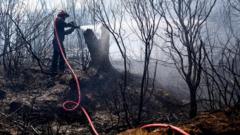Is France's Largest Wildfire in 75 Years Out of Control?

Understanding the Devastating Wildfires in France: Causes, Impact, and Response
The recent wildfires in France have become a significant ecological disaster, marking the largest wildfire the country has faced in 75 years. This calamity has not only devastated vast areas but also drawn attention to the underlying causes, including climate change and environmental neglect. As firefighters continue to battle the flames, understanding the multifaceted aspects of this disaster is crucial for both awareness and prevention in the future.
The Scale of the Disaster
Officials have reported that the wildfire has consumed an area greater than Paris, specifically affecting the Aude region in southern France. Over 16,000 hectares (approximately 62 square miles) have been engulfed in flames, leading to significant destruction and loss. The scale of this wildfire is unprecedented, and it has prompted an extensive response from emergency services.
More than 2,000 firefighters and 500 firefighting vehicles have been deployed to combat the blaze. They are supported by gendarmerie and army personnel, illustrating the seriousness of the situation. Tragically, an elderly woman has lost her life, and over a dozen individuals, including firefighters, have sustained injuries, with some critically wounded. Additionally, several people remain unaccounted for, heightening the urgency of search and rescue operations.
Firefighting Efforts and Challenges
Despite the tireless efforts of firefighters, the wildfire remains a formidable adversary. Firefighting operations have been complicated by the rapid spread of flames, driven by strong winds, dry vegetation, and the prevailing hot summer weather. Fortunately, a reduction in intensity has been reported due to lower temperatures and favorable wind conditions. Firefighters are hopeful for containment, but the situation remains precarious.
Water-bombing aircraft have played a crucial role in combating the flames, showcasing the diverse strategies employed in wildfire management. The aerial support, combined with ground efforts, reflects the urgency and scale of the firefighting operation. Officials have also established 17 temporary accommodation sites to provide shelter for displaced residents, emphasizing the community's need for assistance during this crisis.
The Human and Environmental Toll
The human impact of these wildfires is profound. The loss of life, injuries, and ongoing search for missing individuals highlight the personal tragedies born from this disaster. Additionally, the destruction of homes and entire villages, particularly in the Corbieres region, leaves lasting scars on communities. Mayor Jacques Piraud's description of the devastation in Jonquières paints a grim picture of neighborhoods turned to ash.
Beyond the immediate impact on human life, the environmental ramifications are equally concerning. The wildfires result in the destruction of vast areas of forest and wildlife habitats. This loss not only affects biodiversity but also contributes to climate change by releasing stored carbon back into the atmosphere. The long-term ecological damage from such fires can take decades to repair, underscoring the need for proactive measures to mitigate fire risks.
Climate Change and Its Role in Wildfires
French officials, including Prime Minister François Bayrou, have linked the wildfire to broader issues of climate change and drought. As global temperatures rise, extreme weather conditions become more common, increasing the likelihood of wildfires. The connection between climate change and the frequency and intensity of wildfires is supported by numerous studies, indicating that as the climate continues to warm, such events may become more commonplace.
Environment Minister Agnes Pannier-Runacher also emphasized that the conditions leading to this wildfire are not isolated incidents but part of a larger pattern influenced by climate dynamics. The role of human activity in exacerbating these conditions cannot be ignored, as urbanization, deforestation, and inadequate land management contribute to the vulnerability of landscapes to wildfires.
Community Responses and Future Preparedness
In the wake of the wildfires, communities are coming together to support those affected. Temporary shelters have been established, and local organizations are mobilizing resources to provide assistance. This solidarity is crucial for recovery, as healing from such disasters extends beyond physical rebuilding; it encompasses emotional and psychological support for those who have lost their homes and loved ones.
Looking to the future, it is imperative for communities and governments to prioritize wildfire preparedness and response strategies. This includes investing in better land management practices, enhancing firefighting capabilities, and implementing public awareness campaigns about fire safety and prevention. By fostering a culture of resilience and preparedness, communities can better withstand the impacts of wildfires.
FAQs About Wildfires in France
What caused the recent wildfires in France?
The recent wildfires were primarily caused by a combination of strong winds, dry vegetation, and hot summer weather, all of which have been exacerbated by climate change.
How are firefighters managing the wildfire situation?
Firefighters are employing various strategies, including deploying thousands of personnel and firefighting vehicles, using water-bombing aircraft, and conducting controlled burns to manage the wildfire's spread.
What steps are being taken to assist affected residents?
Officials have established temporary accommodation sites to provide shelter for displaced residents and are mobilizing community resources to support recovery efforts.
What long-term impacts can be expected from this wildfire?
The long-term impacts of the wildfire include ecological damage, loss of biodiversity, and the potential for increased carbon emissions, which contribute to climate change.
What can individuals do to help prevent wildfires?
Individuals can help prevent wildfires by adhering to fire safety regulations, avoiding outdoor burning during high-risk conditions, and participating in local fire prevention programs.
The ongoing wildfires in France serve as a stark reminder of the urgent need to address climate change and improve wildfire management. As communities rally to support each other during this crisis, it is evident that collective action and preparedness can make a significant difference. What measures will you take to support wildfire prevention in your area? #WildfireAwareness #ClimateChange #CommunitySupport
Published: 2025-08-07 12:35:18 | Category: technology



